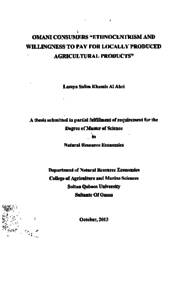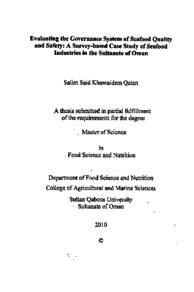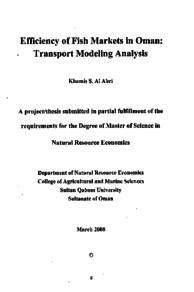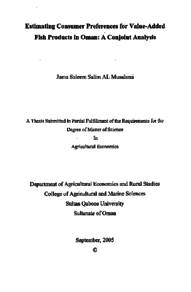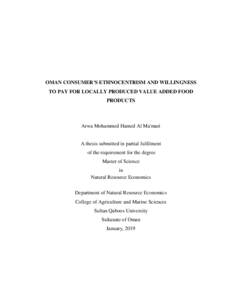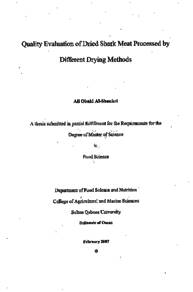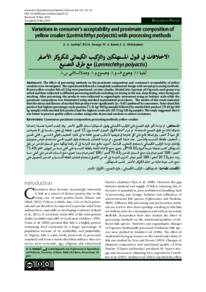Document
Omani consumers"Ethnocentrism and willingness to pay locally produced agricultural products"
Publisher
Sultan Qaboos University
Gregorian
2013
Language
English
English abstract
The continued spread of globalization has resulted in levels of global product availability that is not only unprecedented, but would have been regarded as impossible not too long ago. Products of almost every conceivable national origin (both industrial and fresh agricultural products) are now widely available throughout the world. Because the "country of origin" (COO) label of a product is a factor that in many cases influences the buying behaviour of consumers, government policy makers and businesses know that they need to investigate consumer attitudes toward both domestic and imported products and the findings of these investigations needs to be used to formulate more effective national "buy local" campaigns and marketing strategies. This issue has never been important in Oman than it is now when the country has embarked on strategies to diversify the economy. The success of the diversification strategies by the Oman government would, among other things, depend on the success of the promotion of "locally produced" products. Therefore investigating and understanding consumer attitudes toward both domestic and imported products becomes important. This study intends to do just that by investigating consumer ethnocentrism of Omanis and their willingness to pay premium for locally-produced products. Results indicate that Omani consumers are ethnocentric, and overall they have positive attitude towards locally produced products. Omani consumers would buy locally produced agricultural products, instead of imported ones, when the price and quality of the locally produced products are as good as imported products. Furthermore, a majority of the consumers think that Oman locally produced products are not of poorer quality. In terms of price the views are mixed, while some stated that Oman beef and chicken are highly priced, others (minority) said that Oman tomatoes and cucumbers are highly priced Regarding Omani consumer's attitudes towards "Origin Oman" or "Buy Locally-Produced Products" campaign, majority of consumers think the campaign is successful in persuading Omanis to think about changing their food shopping in favor of local products. Furthermore, consumers think the government should do more and if possible work together with the industry in these campaigns. With regard to the socio-demographic characteristics affecting consumer preferences and Willingness to Pay (WTP) for "Origin Oman" or "Oman locally produced food product", age was found to have significant effect on the willingness to pay premium for beef and chicken BUT is insignificant for locally grown tomato and cucumber. Income was found to be a statistically significant driver of consumer willingness to pay a premium for beef, tomato and cucumber. Male consumers are willing to pay higher premium for locally produced beef than female consumers. Married consumers are willing to pay higher premium for locally produced beef than single consumers. There are however no statistically significant difference in premiums between married and single consumers for locally produced chicken, tomato and cucumber. Consumers with levels of education less than College Diploma are willing to pay a higher premium for local products than consumers with College Diploma and above. Self-employed consumers are willing to pay higher premium for locally produced beef, and chicken, but there is no statistically significant difference in premiums between different types of employment in the case of locally produced tomato and cucumber. These results are broadly consistent with previous studies in the literature.
Member of
Resource URL
Arabic abstract
أدى استمرار انتشار العولمة إلى توافر المنتجات العالمية في الأسواق المحلية بمختلف المستويات والتي لا تعتبر فقط منتجات متميزة وفريدة وإنما كان اعتبار تواجدها مستحيلا بوقت ليس ببعيد. حيث نجد الآن منتجات من مختلف البلدان، سواء المنتجات الصناعية أو المنتجات الزراعية الطازجة، متاحة على نطاق واسع في جميع أنحاء العالم. وتعتبر علامة "بلد المنشأ" (CO0O الموضحة على المنتج أحد العوامل التي تؤثر على سلوك الشراء لدى المستهلك، وبذلك من المهم على صانعي السياسات الحكومية وعلى الشركات دراسة وبحث السلوك الشرائي لدى المستهلك تجاه كلا من المنتجات المحلية والمستوردة واستخدام نتائج البحث لصياغة سياسات تسويقية وحملات وطنية أكثر فاعلية لتشجيع المستهلك على شراء المنتج الوطني. ولم تكن هذه المسألة بذات أهمية بالسلطنة كما هو الحال الآن حيث شرعت السلطنة في وضع استراتيجيات لتنويع الاقتصاد الوطني. فبالإضافة إلى الأمور الأخرى فإن نجاح استراتيجيات التنوع الاقتصادي من قبل الحكومة العمانية تعتمد على نجاح الترويج للمنتجات المنتجة محليا". لذلك فإن دراسة وفهم سلوك المستهلكين تجاه كل من المنتجات المحلية والمستوردة يعد أمرا هاما. حيث قامت هذه الدراسة التحقق في تأثير النزعة الوطنية لدى المستهلكين العمانيين تجاه المنتج العماني ومدى استعدادهم لدفع قسط أو مبلغ اضافي للمنتجات المنتجة محليا.
وتشير نتائج الدراسة أن عامل النزعة الوطنية يؤثر على قرار المستهلك العماني عند الشراء وبشكل عام فإن المستهلك العماني لديه موقف ايجابي تجاه المنتجات المحلية. كما وجدت الدراسة أن المستهلك العماني على استعداد الشراء المنتج العماني عندما يكون سعره وجودته مماثلة للمنتج المستورد. علاوة على ذلك فإن أغلبية المستهلكين يعتقدون أن المنتجات العمانية ليست ذات جودة أقل عن نظيراتها المستورة. أما من ناحية السعر فقد كانت الأراء متباينة، في حين أن البعض ذكر أن أسعار لحوم البقر والدجاج العماني تعتبر مرتفعة فإن الأقلية فقط ذكرت ارتفاع سعر الطماطم والخيار المنتج محليا.
وتشير نتائج الدراسة أن عامل النزعة الوطنية يؤثر على قرار المستهلك العماني عند الشراء وبشكل عام فإن المستهلك العماني لديه موقف ايجابي تجاه المنتجات المحلية. كما وجدت الدراسة أن المستهلك العماني على استعداد الشراء المنتج العماني عندما يكون سعره وجودته مماثلة للمنتج المستورد. علاوة على ذلك فإن أغلبية المستهلكين يعتقدون أن المنتجات العمانية ليست ذات جودة أقل عن نظيراتها المستورة. أما من ناحية السعر فقد كانت الأراء متباينة، في حين أن البعض ذكر أن أسعار لحوم البقر والدجاج العماني تعتبر مرتفعة فإن الأقلية فقط ذكرت ارتفاع سعر الطماطم والخيار المنتج محليا.
Category
Theses and Dissertations

